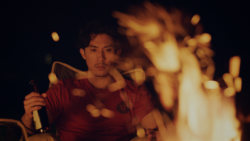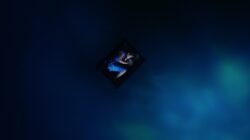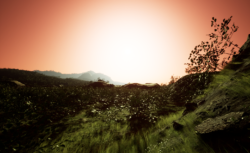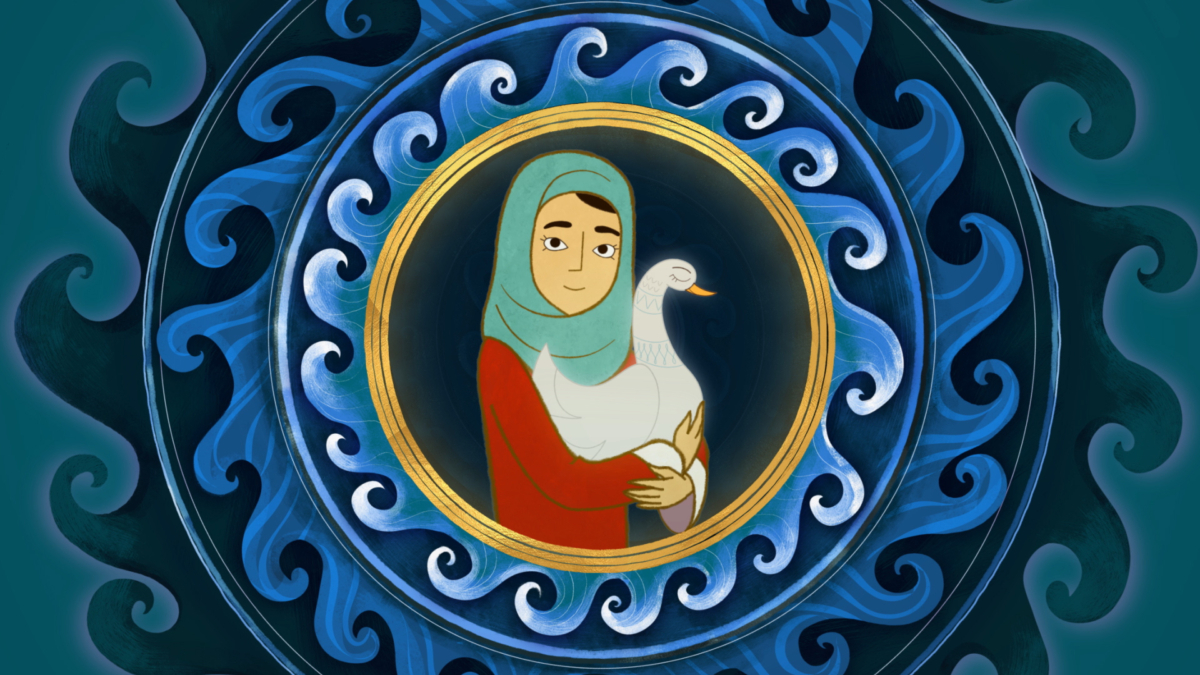In this big, wide world, Asian diasporas experience change and introspection in all sorts of environments. Will it be in the water? In the heat of the sun? Or the shadow of a volcano?
Wherever it is, and wherever they go, there is a story worth telling.
SKIN CAN BREATHE
Watched by: Lucas Manuel-Scheibe
Desire festers under the waves in Chheangkea’s queer short film, “Skin Can Breathe.” Sodavid (Peter Som)’s quiet gaze explores the body of his swim mate Andrew (Matt Zhang) during practice, charging mundane interactions with an intimate sensuality. Chheangkea visualizes physicality through the eyes of the swimmer’s suppressed yearning, tight frames as stolen glances, a topography of desire upon breathing skin.
While Sodavid feels unable to speak to his doting immigrant mother (Sopheap Som) — a dynamic known too well by queer Asian Americans — freedom for his fantasies materialize in his imagination of himself and Andrew together in the pool. Underwater, desire unburdens itself from the gravity of reality. And, while his mother might not understand his quiet anguish, as she washes her son after practice Sodavid pictures himself and Andrew once more in harmony, placing the different forms of love in dialogue across space and time.

(Image Credit: Erin Lau/Inheritance)
INHERITANCE
Watched by: Lucas Manuel-Scheibe
Every local of Hawaii has a complicated relationship with the islands and their changing landscape. To leave or to stay is an all-too-familiar conversation — and for either, the answer lies in the question of “what lies on the other side?” Erin Lau’s short film, “Inheritance,” follows photographer Kelsey (Aoi Takeya) and his tired wrestling with this very tension.
Kelsey photographs the volcanoes that birthed the Islands and sells their beauty to white tourists who wish his fridge magnets were cheaper. His friends are all leaving for the mainland United States for hopeful but shaky futures. In questioning his place, Kelsey finds comfort with his grandfather (Dann Seki) and little brother Scottie (Jaden Murakami), family serving as an entry to the larger picture at stake.
The shadow of neo-colonialism lies in the sigh of every Islander. The tourists just don’t get it, but it’s the small things, too: “I miss [the old] toads, they were quiet,” laments his grandfather, for the invasive ones, the coqui frog, are loud as can be.
Ultimately, Kelsey finds answers in family. Inheriting the Hawaii of his immigrant grandfather, Kelsey must foster a world that the next generation will inherit from him. The most important photography that he undertakes is not of boiling magma, but in a moment of education; he teaches Scottie how to take a picture of the family trio, all three generations in portraiture on the Hawaii they are grateful to call home.

(Image Credit: Maya Tanaka/Honolulu)
HONOLULU
Watched by: Lucas Manuel-Scheibe
Flaming lobsters and third-degree sunburns galore, Maya Tanaka’s “Honolulu” exudes the quiet, off-beat comedy inherent in the most mundane family skirmishes. Twelve-year-old Yuki’s reserved introspection imagines sharks and turtles abound in the water as a way to avoid her oafish father’s attempts at a beach vacation. But not even an escape underwater can prevent an awkward traipse into puberty as she finds herself with her first period. Thank God Grandma has a handkerchief — Dad couldn’t find pads, and who knows how to use a tampon!
Yuki’s menstrual misery serves as a boiling point between her and her family, but avoids the melodrama often afforded by this situation. Instead, “Honolulu” seeks to explore the warm dysfunction of a family making an effort. Most importantly, the film presents itself in large part from Yuki’s perspective; the quiet but pivotal moments a young girl actually remembers from her family vacation — third-degree sunburns, embarrassing periods, and flaming lobsters included.
THE OCEAN DUCK
Watched by: Chen-Yi Wu
Chicago-born Iraqi American, Huda Razzak, and co-director My Anh Ngo, portray a heartwarming blend of Arab and Persian cultures in their delightful creation, “The Ocean Duck.” Drawing inspiration from the illuminated manuscripts of the poet Rumi, this animated story beautifully depicts the special bond between a grandmother and her granddaughter. The filmmakers combine traditional hand-drawn animation with puppet animation, resulting in a captivating and unique visual experience.
The narrative unfolds during a storm, where the granddaughter makes her way to the hospital to visit her ailing grandmother. This poignant experience becomes a trigger for the young lady to reminisce on the cherished moments they have shared in the past. “There once was a duck who was raised in the hen house…” symbolically drawing parallels between the duck’s journey and the grandmother’s situation in an all-white hospital gown, orchestrated by the directors’ mise-en-scène. As the storm approaches and the hospital begins to flood, the film poetically explores the inevitability of life’s journey, where rough waves will eventually find us all. However, in the words of the poet, “We are all water birds, and the ocean knows our language.” The characters find solace and meaning amidst life’s natural course. Indeed, life unfolds with its own arrangements and destinations, and “The Ocean Duck” beautifully captures the essence of this universal truth.
ROOTED 防己
Watched by: Chen-Yi Wu
The Chinese title of this thirty-minute drama, “防己” (pronounced “fángjǐ” in Mandarin), takes on multiple meanings. It refers to a Chinese herbal medicine known for its detoxifying properties, as well as the literal meaning to “prevent someone from themself.” The teenaged protagonist, Wang Yunwu (Wei-jie Lin), experiences a false drowning incident, leading him to embark on a journey of self-discovery and desire after being “rescued” by the lifeguard, Wang Dahe (Yuan Hom Wang). Taiwanese director Wu Yiwei delves into the complexities of adolescent perception, the body, and desire within the context of Asian society.
An intriguing aspect of the story is Yunwu’s family background in Chinese medicine. “See, hear, ask, and touch” (“望聞問切”), the four diagnostic methods used in the doctor’s consultation, emphasize physicality, which stands in stark contrast to Western medicine’s reliance on instruments. Yunwu’s fascination with Dahe centers around the exposure of the lifeguard’s body to the public eye, as he needs to interact with tourists and pose for photos. Dahe’s physique becomes both an object of observation for Yunwu and the public.
Interestingly, while Yunwu’s initial attraction to Dahe sparks at the seaside, all subsequent thoughts and his desires take place in more private spaces, such as clinics and rooms. This dichotomy highlights the tension between public display and private contemplation of Asian teenagers’ wants and desires.

(Image Credit: Angeline Meitzler/The Roaring of the Carabao)
THE ROARING OF THE CARABAO
Watched by: Chen-Yi Wu
In “The Roaring of the Carabao,” a haunting Filipino American experience unfolds, aiming to bridge the temporal and spatial gaps between different generations and confront the silenced chapters of colonial history. Director Angeline Marie Michael Meitzler employs a combination of a recreated 3D model and CGI animation of the eruption of the Taal Volcano to resurrect the silenced and suppressed history of the Philippines. On a fateful night, the volcano erupts unstoppably amidst the scorching summer, embodying both life and death — the transmission of past trauma and the absence of a hopeful future. The city of Manila lies still in the darkness, devoid of people and moonlight, except for the eerie glow of amber, which the narrator perceives as a guiding light.
In the face of this history, the narrator “I” finds themselves uttering “get this off me” from the shackles of the colonists’ “force is the only solution” mantra. Heat and moisture, palpable sensations on the skin, serve as a metaphor for the colonized experience — a haunting specter impossible to shake off. Throughout the narrative, only voices echo, and no physical presence is seen. This absence of the subject becomes a poignant perceptual experience. Consequently, this void compels a search for a language of expression, becoming a driving force that encourages dialogue and discussion.
The “Fire & Water: Shorts in Your Element” shorts block screened at the 46th Asian American International Film Festival.

